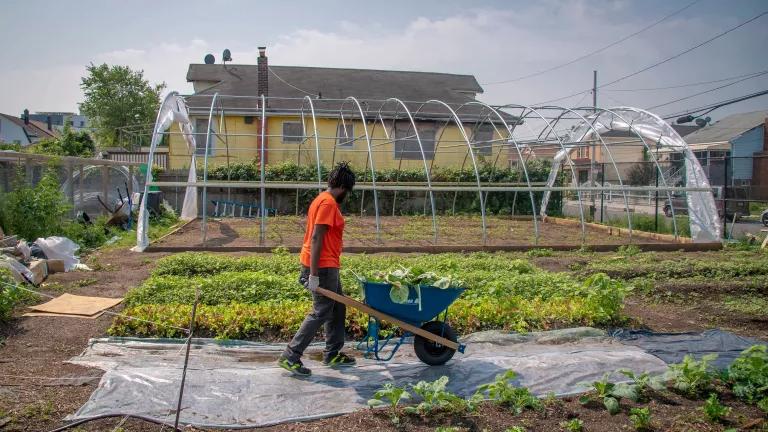Recycling Education Grants Must Address Food Waste
NRDC has three priorities for EPA's IIJA funded grants for consumer recycling education and outreach.
Update as of November 2022: EPA released grant program guidelines which included our recommendations. More information as well as the Model Recycling Program Toolkit can be found at EPA's Recycling Education and Outreach Program website.
With funding provided through the Infrastructure Investment and Jobs Act of 2021, EPA is developing a pair of grant programs that have the potential to significantly improve progress towards our nation's goal to reduce food waste by 50 percent by 2030. The first program focuses on improving the effectiveness of residential and community recycling programs through public education and outreach while the second grant program covers solid waste infrastructure for recycling.
The agency has engaged in several listening sessions and is requesting information from stakeholders as to local needs, best practices, and models to consider in their development of the programs. NRDC sees three elements as an important part of the grant program’s effectiveness.
1. Recycling Education and Outreach Programs Must Include Wasted Food and Organic Materials
Recycling Education and Outreach Programs must address wasted food, yard debris and organic materials in addition to traditional recycling materials. EPA estimates that 24 percent of landfilled and combusted material is food, more than any other single material in our trash. Much of this food is wasted at the household level – 37 percent of food waste occurred at the residential level in 2019. Therefore, it is imperative that waste reduction and recycling education and outreach programs address how to manage wasted food and organic material. We have numerous examples of how Denver Public Works’ Solid Waste Management comprehensively addresses organics and food waste education and outreach.
2. Recycling Education and Outreach Programs Must Focus on Waste Prevention
While food scrap recycling is an important strategy for keeping food out of landfills and incinerators, the greatest environmental, economic, and social benefits are associated with reducing or preventing food from becoming waste. EPA’s own food waste management hierarchy highlights the need for source reduction above all other management strategies. Education and Outreach plans should incorporate the entirety of the hierarchy and should above all emphasize strategies to prevent food from entering the waste stream. By emphasizing waste prevention, we can decrease the need for waste processing infrastructure, extend the operation of landfills, and reduce pollution from incinerators.
Food waste prevention and recycling education and outreach materials can draw from numerous existing resources. Primarily, the National Academies of Sciences, Engineering and Medicine 2020 report A National Strategy to Reduce Food Waste at the Consumer Level makes several recommendations which are relevant to EPA’s grant program. For example, the report highlights numerous behavior change interventions to prevent food waste which could be elevated through the model toolkit. Additionally, the report calls on federal agencies (including EPA) to provide for rigorous evaluation and implementation guidelines. NRDC’s household food waste prevention campaign Save The Food has additional examples of prevention messaging and resources that states and local governments have incorporated into their recycling education programs across the country.
Food scraps recycling education efforts should emphasize – in vocabulary, construction, and imagery – that recycling is meant for inedible food scraps and other compostable organic materials rather than for safe and edible foods. Federal funding should be prioritized for projects that incorporate source reduction as a principal strategy and should support mechanisms for measuring the impacts and benefits of prevention-focused efforts.
3. Recycling Education and Outreach Programs and the Model Toolkit Must be Flexible and Relevant to Diverse Communities
In order to be a model that is practical and useful for states, tribes, local governments, nonprofit organizations, and the private sector, the Toolkit must include guidance and information that is relevant to racially, culturally, linguistically, socio-economically, and regionally diverse audiences. The toolkit should not only incorporate best practices for the collection and processing of recycled materials, but it should include best practices for educating communities toward sustainable behaviors. Training modules should recognize and be tailored to unique needs of diverse audiences, including those in multi-family dwelling units and other communal settings with particular recycling challenges. The toolkit should include descriptions of how the models can be adapted to reflect diversity such as different cultural practices, multiple languages, and local priorities. We have outstanding examples of how multiple cities have adapted food waste awareness campaigns. The grant program and the model toolkit should incentivize approaches that take an intersectional approach to waste, simultaneously addressing social, economic, racial, health, and environmental impacts by recognizing that local knowledge will best inform community needs.
NRDC sees a great opportunity to address interconnected climate, environmental, economic, and social justice issues in the Recycling Education and Outreach grant program and model program toolkit. Through this critical funding, EPA can help state, local, and Tribal governments improve education and outreach on how to prevent food from becoming waste and how to correctly dispose of inedible food scraps that can instead be recycled into nutrient-rich soil amendment rather than generating greenhouse gas and other harmful pollutants when landfilled or incinerated. Addressing food waste and recycling food scraps are key to improving municipal solid waste management, long-term climate goals, and a host of environmental, economic, and social benefits.




